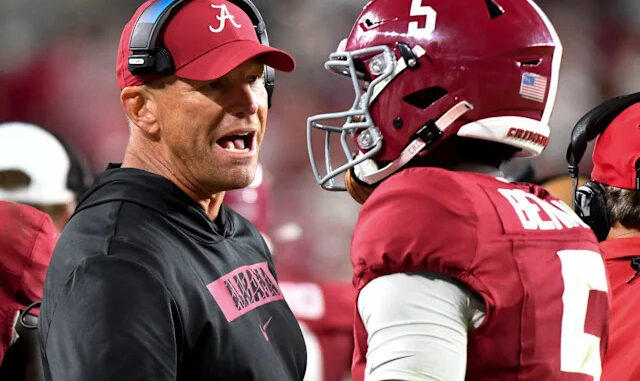
When Kalen DeBoer accepted the head coaching job at Alabama in January 2024, he didn’t come completely alone. Among those who would make the switch with him was wide receiver Germie Bernard, who transferred from Washington to Tuscaloosa to join DeBoer’s Crimson Tide. Bernard’s move was not a simple change of scenery — it was a calculated decision rooted in trust, opportunity, continuity, and belief in DeBoer’s system.
First and foremost, trust in the coach and staff played a central role. Bernard had already played under DeBoer’s staff at Washington, and that prior relationship fostered confidence. He saw firsthand the care DeBoer and his assistants took with players—not just as athletes, but as people. In interviews, Bernard has emphasized how DeBoer’s staff invested in their players’ development both on and off the field. That kind of buy-in to the person behind the player matters deeply when deciding to uproot and transfer.
Closely tied to trust is continuity of system and scheme. Bernard had familiarity with DeBoer’s offensive philosophy and had already begun internalizing its demands while at Washington. He knew what was expected: the routes, the timing, the spacing, the intelligence and discipline required. Moving to Alabama under the same head coach (and with parts of the staff in common) meant Bernard would not have to relearn everything from scratch. That continuity gives him a head start in contributing immediately at a high level.
From a playing-opportunity standpoint, Bernard could see a more prominent role in Alabama’s offense. At Washington, even though he had played and contributed (34 receptions for 419 yards in 2023) , he was behind elite receivers like Rome Odunze, Jalen McMillan, and Ja’Lynn Polk. At Alabama, with a fresh roster and a new coach, Bernard had the chance to be a featured option, to leap into a leadership role, and stake his claim as a go-to receiver.
Another motivating factor was relationship with staff beyond just the head coach. Bernard also followed wide receivers coach JaMarcus Shephard from Washington to Alabama. That continuity in positional coaching meant a smoother transition in daily life: the same communication, the same expectations, a known mentor in a new place. That relational consistency can be a major anchor when transferring schools.
Moreover, the track record and success of DeBoer’s offense appealed to Bernard’s ambition. Under DeBoer at Washington, the Huskies’ offense posted impressive numbers and placed multiple receivers in the NFL Draft. Bernard saw how receivers under that staff could thrive, and he wanted to be part of that success. In his own words, he believed that being in DeBoer’s system gave him the best shot to put up big numbers and help lead a high-powered offense.
Finally, leadership ambition and legacy building cannot be overlooked. Bernard understood that by transferring, he wasn’t just chasing personal stats—he was positioning himself to be a cornerstone of the new regime at Alabama. He has spoken of the responsibility to bring younger receivers along, to mentor them, and to carry forward the standard set by past Alabama greats. Indeed, in his first season at Alabama, he tallied 50 receptions for 794 yards, leading the offense in receptions and showing that his bet had already begun paying off.
In summary, Germie Bernard’s decision to follow Kalen DeBoer from Washington to Alabama was driven by a convergence of trust, scheme familiarity, opportunity, relational continuity, and ambition. He believed in DeBoer’s vision, felt confident he could flourish in that offense, and saw in Alabama not just a new team, but a platform to lead, contribute, and elevate his career.
Be the first to comment